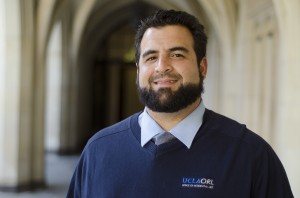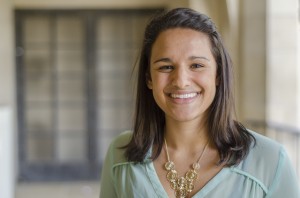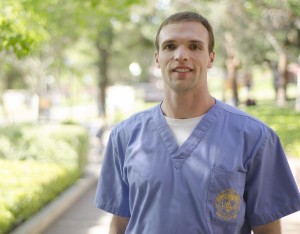Three UCLA students will be awarded the Charles E. Young Humanitarian Award on Thursday for their contributions and commitment to community service projects.
The Charles E. Young Humanitarian Award was created in 1986 by students, faculty and staff to recognize and encourage students who serve in their communities. Recipients are awarded a $1000 donation for a community service project of their choice.
The reception will be hosted by Student Organizations, Leadership & Engagement.
******

Before coming to UCLA as a graduate student, Michael Oshiro worked as a special education teacher with teenage girls who were in foster care or previously incarcerated.
The experience was one he wanted to pursue again at UCLA, so he searched for a project that would give him the chance to do hands-on work with the community.
Oshiro is a coordinator for the Incarcerated Youth Tutorial Project, a 25-year-old organization started by the Muslim Students Association.
The project offers tutoring and mentorship programs for young men at Camp Miller, a Los Angeles county probation camp for incarcerated youth in Malibu. It also offers General Education Development test assistance, preparation for the California High School Exit Examination and mentoring.
Oshiro, a graduate student pursuing a joint doctoral degree in special education at the California State University of Los Angeles and UCLA, said the Incarcerated Youth Tutorial Project also reaches out to UCLA students about social inequalities.
The Incarcerated Youth Tutorial Project informs students about subjects such as the prison industrial complex and the school-to-prison pipeline.
Oshiro explained the school-to-prison pipeline as a combination of social and economic mechanisms by which students of color are being pushed out of school and into prisons, like low funding amounts for some public schools.
“There is an increase in kids being locked up for minor things, things traditionally addressed in school,” Oshiro said. “The kids are identified young and they … are pushed into the prison system.”
Oshiro said he thinks the efforts of Incarcerated Youth Tutorial Project are gaining more recognition this year because of the organization’s push to have a bigger presence on campus through more programs and events.
“I don’t think the award is for me. It’s an award for the project,” Oshiro said. “I’m just the name on the application.”
Ayesha Khan, an assistant project director of Incarcerated Youth Tutorial Project, said Oshiro’s leadership skills and his love for the cause have been an important part of the success the group achieved in the past year.
“If there’s anyone I could think of that would deserve (the award), it would be him,” said Khan, a third-year microbiology, immunology and molecular genetics and global studies student. “I’ve learned so much from him.”
******

Even after patients of the Mobile Clinic Project at UCLA no longer need assistance, some continue to come back to talk to the volunteers, something that makes Tara Noorani feel like her work has been worth it.
“They come back and want to know about our lives,” Noorani said.
The fourth-year physiological science student became involved with Mobile Clinic when a resident assistant told her about the project in her second year at UCLA.
Now, Noorani is a coordinator of the Mobile Clinic Project at UCLA, a project run by more than 50 undergraduate students coming together with medical, public health and law students.
“After seeing the struggles and listening to the different perspectives (of the homeless), you can see that they are really no different than your mom, your dad or yourself,” Noorani said.
Mobile Clinic visits sites in Santa Monica and West Hollywood every Wednesday and Saturday, rain or shine, she said.
Noorani said she thinks the lives of the homeless are not always consistent, but she hopes they can count on Mobile Clinic to be there no matter what happens.
“That consistency is what stole my heart. When you’re there so consistently, you develop friendships and build relationships with them,” she said. “You feel like you have a larger social obligation.”
One of Noorani’s favorite parts of working with the clinic is listening to clients’ stories.
“Aside from the medical experience, the main thing I have gained is a new perspective,” she said.
Although she said she thinks it is humbling to receive the award, she hopes that people are most impressed with what Mobile Clinic has done as an organization.
Many clients continue to come back to Mobile Clinic after having received housing and no longer need assistance, Noorani said.
******

Brian Lehigh houses about 1,000 toothbrushes and toothpaste tubes in his apartment’s bathtub.
The dental hygiene equipment is the result of dozens of letters to toothbrush companies asking for donations.
Leigh started the Veterans Services Committee under the American Student Dental Association this year to provide dental care for veterans in the community.
The Veterans Services Committee’s first project, Stand Down, holds events throughout the Los Angeles County for homeless and impoverished veterans, providing food, shelter, clothing and other services.
Some veterans go to the U.S. Department of Veteran Affairs for medical services, but they only receive health coverage for certain things, Lehigh said. Service-related injuries and health problems are covered, but if they just have a cavity, they may have to pay to get care, Lehigh said.
Lehigh spent the summer before dental school volunteering for Veteran Affairs because he wanted to see more dental specialties like oral surgery. Assisting, watching and hearing their stories, Lehigh said he thought there was something he could do to help the veterans.
He remembers one patient specifically during his time volunteering for Veteran Affairs who had been exposed to Agent Orange. Working with the patient inspired him to help veterans in need.
“He was the nicest guy. He had a lot of health problems but he was pretty upbeat. His spirit was still there,” he said.
Although Lehigh has been a part of many other clubs and services, the Veterans Services Committee is something he created himself. Lehigh said he does not approach service with a specific framework and is constantly thinking of new events to get people involved.
Lehigh said his future projects could include going to Veteran Affairs to give lectures on oral health topics for veterans in transitive housing and substance abuse programs.
